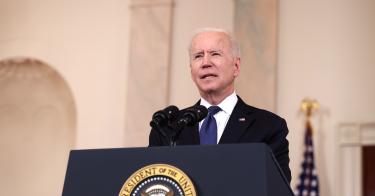Between our two families, we are raising 11 children.
Under the American Families Plan, we could start collecting up to $33,600 per year in child payments. Had this plan been in place when we became mothers, we could have pocketed up to $630,000 in total child payments, cashed in on 60 years of subsidized child care and universal pre-K, and would have enjoyed at least five years of paid family and medical leave. And we’d be eyeing up to 22 years of “free” community college for our kids.
So why do we oppose this federal largess? Because we don’t like politicians dangling dollars at families to get them to manage their affairs the way the politicians would prefer. Instead of “nudging” families into needless dependency, we’d rather lawmakers encourage families to pursue opportunities and make decisions that are best for their unique situations.
For example, many lower- and middle-income families strongly desire that family members care for their children. In fact, trading income for time at home with kids is part of the reason certain families have lower incomes.
>>> 5 Things You Need to Know About Biden’s $1.8 Trillion American Families Plan
The plan’s supporters view taxing some families to pay for other people’s child care as an “investment.” But they count mothers and fathers sacrificing paid work opportunities to spend more time raising their children only as lost wages, lost government tax revenues and a drag on GDP.
That’s not only bad math, it’s bad policy. There is simply no compelling evidence that government attempts to enroll children in child care or preschool improves school readiness or other life outcomes, but there is evidence of unintended negative consequences.
Speaking of bad investments, consider where the money would come from. The American Families Plan would be funded on the backs of our children—and they already own $67,000 apiece of the national debt. Their share of debt will increase by $3,700 per year over the next decade, even before factoring in the additional $4.5 trillion in proposed “infrastructure” and “family” spending.
We wouldn’t take out loans in our children’s names to send them to preschool or to finance monthly child payments for ourselves. Why should we support the government doing so?
President Joe Biden says he can pay for all this by taxing the rich. But sober analysis shows that super-sized government entitlements like these require soaking the middle class, just as they do in Europe. Below-average earners pay 45% and 43% tax rates in Germany and France, and the middle-class pays 56% and 70% marginal rates. That’s before a 20% VAT is added to their purchases. That’s a lot less money left for families to pursue what’s best for them.
Government regulations already increase the cost and limit the supply of child care, driving smaller, less expensive and more flexible providers out of existence. Between 2005 and 2017, the number of small, in-home child care providers fell by half. The American Families Plan would require providers to follow government curricula and institute “inclusion” programs. It would also impose the kind of excessive standards that led to a $20,000-per-year price-tag for child care in D.C.
These requirements will make it harder for parents to find lower-cost, more flexible arrangements such as a neighborhood provider, a church daycare, or a parent co-op that aligns with their own needs and preferences. Nothing in this proposal expands child care and education choices beyond those sanctioned by politicians.
And lastly, this proposal will do more to hurt working women’s prospects than to help them.
A government-paid leave entitlement may sound like a win, but government-mandated flexibility isn't flexibility at all. Imagine navigating a massive bureaucracy to apply for benefits, potentially waiting 10 weeks after you needed leave to find out if you qualify, having to track your leave in 15-minute increments, or having your employer cut off access to your work email and files while you’re on leave.
As two mothers who depend heavily on workplace flexibility and family-friendly policies, we’d rather keep the government out of our arrangements. Over the last four years, the number of employers providing paid parental leave has doubled. Lawmakers should encourage that, not try to supplant it.
>>> The American Families Plan Will Do More Harm Than Good
When employers have paid family leave programs forced upon them, they may be less likely to hire or promote women, particularly for managerial positions. According to Pew Research Center, countries with government paid-leave programs tend to have larger gender wage gaps. And female workers in European Union countries are far less likely than American women to hold managerial positions.
Decades of ostensibly “pro-family” policies have proven ineffective in achieving their goals. Often, they’ve been detrimental to women and families, including for those with lower incomes. In California, high-income mothers are five times as likely to use the state’s paid family leave program as low-income mothers are.
Sen. Tim Scott (R-N.C.) recently observed, “The beauty of the American dream is that families get to define it for themselves.” The American Families Act would wither that beauty beyond recognition.
This piece originally appeared in The Sacramento Bee




